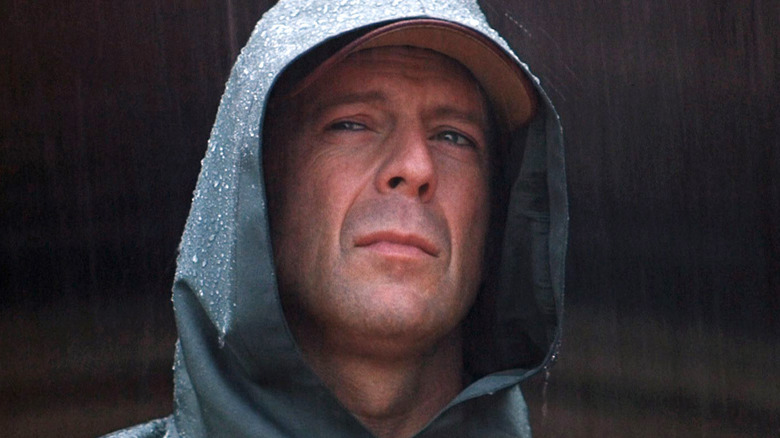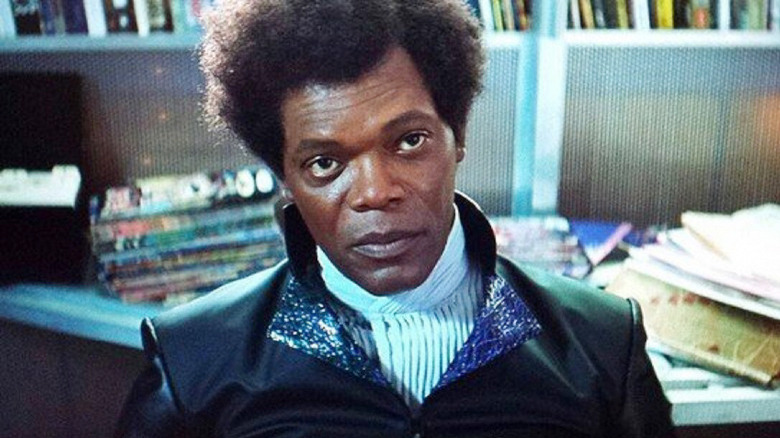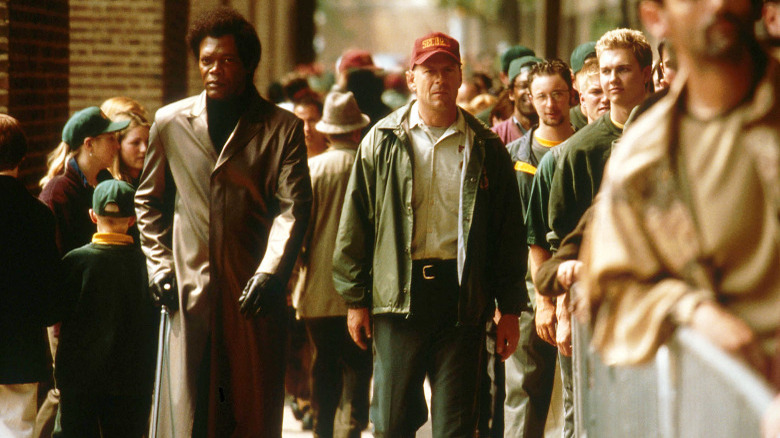The Original Ending To Unbreakable Left More Questions Than Answers
These days, nobody would blink twice at a hotshot director following their breakout film with a superhero movie. In 2000, however, few expected M. Night Shyamalan to go from making the Oscar-nominated, box office chart-topping supernatural thriller "The Sixth Sense" to helming "Unbreakable," a film where Bruce Willis learns he's capable of superhuman feats. (Clearly, he'd never watched himself in "Die Hard.")
Far from a conventional superhero origin story, "Unbreakable" revolves around David Dunn (Willis), a security guard who, upon emerging as the sole survivor of a horrific train crash, is approached by Elijah Price (Samuel L. Jackson), an eccentric comic book aficionado with brittle bone disease who believes David possesses incredible strength and power. Most of the movie plays out as a slow-burn exercise in suspense as David grapples with the truth about who he is and how denying his identity has left him estranged from his wife and son. In time, though, David brings his life back into balance by becoming the real-world superhero he feels he should be.
Then comes the late gut punch everyone was expecting after "The Sixth Sense": David learns that Elijah caused many terrible "accidents" (the train crash included) in his search to find the Batman to his Joker, so to speak. "Unbreakable" thusly ends with multiple freeze frames and onscreen text revealing Elijah was sent to an institution for the criminally insane after David reported him to the police — a notable change from the conclusion in an earlier script draft.
'They Called Me Mr. Glass'
When interviewed by Creative Screenwriting in 2015, Shyamalan confirmed his "Unbreakable" screenplay once ended with David stepping into a crowd of "ordinary people, walking on an ordinary street, in an ordinary city." As he explained:
"I think the greatest twists are when things change fundamentally. The two films I always use are 'Planet of the Apes' and 'Psycho,' where what you thought you saw you did not see. In Unbreakable what you thought you saw was a superhero becoming a superhero. But that's not what you saw. The whole movie twists and turns on its head. It's a kind of fundamental change that I was going for, that I didn't quite get before."
It seems part of the reason Shyamalan made this change was to clearly explain what became of Elijah and not leave audiences with more questions than answers. But more than that, he appeared to realize that a scene alluding to the notion that superheroes walk among us (even one as quiet as what he had in mind) is innately more upbeat than one where a visibly devastated David walks away from his once-trusted mentor and friend, tears welling up in his eyes. There's been many a superhero film and comic book that appropriately ended with an image of the hero carrying out their duties in the everyday world, but for a movie as melancholy and willing to wrestle with bleak existential ideas as "Unbreakable," that doesn't feel like the right approach.
Was There Another Un-Filmed Ending?
As part of EW's Oral History of "Unbreakable," , Disney's former film production president Nina Jacobson discussed her own feelings about the movie's ending:
"I remember conversations about the ending. The hero walking away from the villain always troubled me. And to leave so much unknown was something I wondered aloud about to Night. So maybe there should be a sequel."
She wasn't alone in that regard. An "Unbreakable" sequel was the subject of speculation for years after the film's release. In EW's Oral History, artist Derek Thompson — who created the original comic book illustrations featured in the movie — even claimed that an early script he read had David realizing the truth about Elijah through a talk with the latter's mother about a piece of art depicting "this mysterious, shadowy figure working on a robotic arm in a wheelchair" at Elijah's gallery. "It had this powerful, haunted ambiguity to it. But the idea was that this was meant to be an Act One movie. It was meant to tee up two more films," Thompson added.
Shyamalan, for his part, told EW there was never an un-filmed ending where David didn't shake Elijah's hand and use his ability to see the worst things people have done by touching them to uncover the truth. Of course, Shyamalan didn't deny that he'd always wanted to make a trilogy of movies based in the "Unbreakable" universe either, and would realize that dream in the years after that interview.


